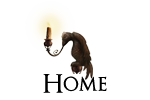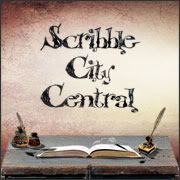Ever since I opened the very first book of Michelle Paver's epic Chronicles of Ancient Darkness series, I have been hooked on her Mesolithic boy-hero's adventures. Torak, his friend Renn and his animal brother Wolf are now three of my favourite characters in children's fiction, and in the course of reading their stories I've also learned a great deal about how those ancient post-Ice Age clans lived their day-to-day lives--it's altogether a fascinating combination. I have the utmost admiration for Michelle's dedication to researching her books--she has, variously, ridden through the forests of Lapland, eaten elk heart and spruce resin, peered into the mouth of a large bear to see what colour it was and swum with killer whales. That is what I call true love for your readers, and I can assure you there are many more things she's done in the name of 'getting it right' which I haven't even mentioned! Given Michelle's hectic schedule (and the fact that she had a tight deadline for her newest book--an Arctic ghost story for adults which will be published by Orion in October), I feel very lucky that she has taken the time to answer my questions. Over to you, Michelle, thanks so much for doing a Mythic Interview Friday (and I agree with you totally about Odysseus and Pegasus).
1. Do you think that the retelling of myths is important or relevant for the children of today? Why should they care about some “dry old stories” which come from ancient or forgotten cultures they might never even have heard of?
Myths have lasted for thousands of years because they're terrific stories with deep and immediate emotional appeal. Why do they have such appeal? I think it's because they illuminate essential truths about human nature and the natural world. For instance, the Inuit Mother of The Sea, who when she's in a good mood, sends seals to the surface to be caught by men, but when she's in a bad mood, drowns them in her long hair. Or Sisyphus, endlessly rolling his boulder up the hill, only to have it roll down to the bottom again... Once you've heard these, you don't forget them. I think that's the answer to the question, Why should children care about old stories from ancient cultures? There's no "should" about it. They'll care if the stories are well told. Because they're amazing stories.
2. What age were you when you came across your first myth or myths? Tell us how you felt then about the myths you first discovered. Did you love them or hate them? Did they scare you, excite you—or were you indifferent? What kind of myths were they? Greek? Norse? Native American? Celtic? Or from another culture entirely? Were they in a book you read? Or did you hear them as oral storytelling from someone else?
When I was about seven, my father gave me a big book of myths and legends from around the world called Once Long Ago by Roger Lancelyn Green. In it I read about Ancient Egyptian tomb thieves, Scottish goblins, an Icelandic witch in a stone boat, a magic bird from Persia, a Chinese monster who eats people (messily) - and many more. I adored them. They were strange, terrifying, vivid, violent and uncompromising. They opened up the world for me, and they helped make me a writer. I've still got that book, and I still find it enchanting. I can't think of a better present for a parent to give their child. After Once Long Ago, I read every collection of myths I could find in the library. I particularly loved the Greek and Norse myths. I read Roger Lancelyn Green's re-telling of the Odyssey, and from then on, Odysseus became my hero. I admired him because he was so clever, and I thought it was absolutely right that he should be a favourite of Athene, who quickly became my favourite goddess, too. For different reasons, I also adored the Norse myths. They seemed to have a dark glitter about them, and they created such a vivid and harsh picture of life in the far north.
3. Looking back, what is your favourite myth of all time, from any culture? And why would you choose it?
Sorry, but I couldn't possibly single out one favourite myth. Perhaps this is because different myths speak to me at different times in my life and when I'm in different moods. And I suppose that's what they're supposed to do: to help us make sense of the world as we go through life.
4. Who is the mythical hero or heroine you like most--and what made you feel that way about them?
As I said, Odysseus has been a hero of mine from when I was little, and that didn't change when I grew up and read the original Odyssey and Iliad (my favourite translations are those by Robert Fagles). I've also been a great admirer of the Norse God Odin from when I was small. He's such a mysterious figure, travelling incognito in his wide-brimmed hat, sacrificing himself to gain the gift of poetry. And he's often accompanied by wolves and ravens, which as a child I found fascinating - while as an adult I came to appreciate the deeper and more frightening aspects of his personality.
5. Is there a mythical beast you are particularly fond of? If so, which one?
I'm particularly fond of Pegasus, simply because of a book I had when I was very small. It was Nathaniel Hawthorne's beautiful re-telling of the myth, told without condescension and with many fine, original touches that made the story spring to life. The pictures, by Herschel Levit, were amazing, too, and hugely inspiring to a small child. Pegasus was white and fierce-looking - I loved the scene when Bellerophon was struggling to tame him - and his wings were powerful and naturalistically drawn: they looked as if they would really fly, and fly well!
6. How have myths had an influence on your writing life, if at all?
Even in my adult novels, myths and legends kept creeping in. For instance, in my second novel, A Place in the Hills, my archaeologist heroine makes a find in a cave, and imagines she hears the rough whisper of Pegasus' wings. But in my Stone Age series, Chronicles of Ancient Darkness, myths took centre stage. I don't mean I've adapted the old myths. In fact, I've had to make new ones of my own, because my Mesolithic hero and his people didn't hand down their myths to us. But I have borrowed elements from the myths and legends of more recent hunter-gatherers, such as the Inuit, the Ainu, and the tribes of the Pacific North-West. And it can't be by accident that like Odin, my hero, Torak, ends up with wolves and ravens for companions.
More about Michelle:
Born in Malawi to a Belgian mother and a father who ran the tiny 'Nyasaland Times', Michelle Paver moved to the UK when she was three. She was brought up in Wimbledon and, following a Biochemistry Degree from Oxford, she became a partner in a big City law firm. She gave up the City to follow her long-held dream of becoming a writer. Successfully published as an adult author, the Chronicles of Ancient Darkness are her first - brilliant - books for children.
Michelle's website is HERE
Subscribe to:
Post Comments (Atom)

















7 comments:
I loved 'Wolf Brother', Michelle. It is so powerful. I must catch up with the rest of the series now. Another very interesting interview, Lucy.
Thanks, Jo--you won't regret reading them, I promise.
Mmm, dark glitter, I like
I love that goddess who tangles up seals in her hair and drowns them! OK, that makes me a bad person.... thank you, Michelle/Lucy :-)
http://stroppyauthor.blogspot.com
"Strange, terrifying, vivid, violent and uncompromising." Just so! Well said, and now I too want to read Inuit tales.
A great collection of Inuit tales is 'Daughters of Copper Woman' by Anne Cameron. Can't remember whether it has seal goddess tale, but pretty sure it mentions her somewhere. Well worth a read.
Wonderful interview with one of my very favorite children's authors. Thanks!
And just to chime in, the Inuit myths are great, as are the native Canadian and American tales.
Post a Comment